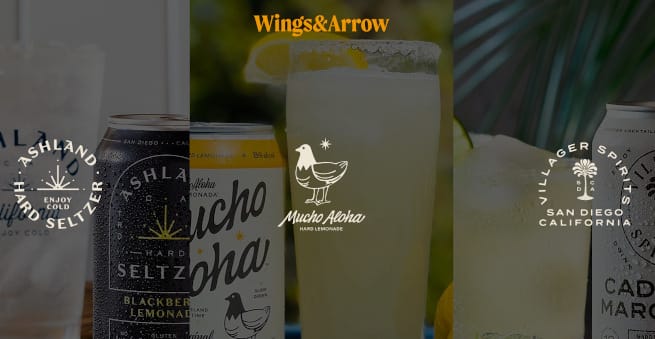- The Taster Tray
- Posts
- How to completely screw up your time in the craft beer biz, and other stuff too...
How to completely screw up your time in the craft beer biz, and other stuff too...
Read time approx. 4 min.
Just Tapped
None of us appreciated the likes of A-B InBev and MillerCoors meddling in the realm of craft beer, but at least those companies did it with some intention and with varying degrees of success. On the other hand, Constellation Brands, the massive beer company that controls the most-popular Mexican beers in the USA, bumbled into the craft beer game with its arms flailing and its head spinning. Now it is running away, tail between its legs. You'll find that story, and more, on today's Taster Tray.
Gracias, adiós y buenas noches
Last week we shared the news that Anheuser-Busch InBev sold Appalachian Mountain Brewing back to the brewery's original founders. This week we share another story about Big Beer hopping off the craft beer train. Constellation Brands (Corona, Modelo, Pacifico, etc.) just sold the last two craft breweries in its portfolio back to the original owners.
First up, Florida's Funky Buddha Brewery is now back in the hands of Ryan and KC Sentz, the original owners. The Sentz brothers (above) said that Funky Buddha will move forward with a “focus on beverage innovation, new consumer experiences, and additional product lines.”
“As we embark on the next chapter, we plan to push boundaries and create entirely new drinking experiences in beer and beyond. We’ll be serving good vibes on tap for many years to come.”
But that ain't all. Last week we also learned that Constellation Brands sold Texas-based Four Corners Brewing back to its original owners. So let's recap Contellation's less-than-successful dance with craft beer:
The Ballast Point Blunder. In 2015 Constellation acquired San Diego-based Ballast Point Brewing for $1 billion. In late 2019 it sold Ballast Point to Chicago-based Kings & Convicts Brewing for $41.1 million.
The Funky Buddha Flail. In 2017, Constellation acquired Funky Buddha Brewery. The company underwent two separate rebranding efforts in the following years but apparently never achieved the kind of growth and profitability Constellation imagined. Now sold back to the original owners. Terms not disclosed.
The Four Corners Freefall. In 2018, Constellation acquired Dallas-based Four Corners Brewing. Since its acquisition, Four Corners' annual production has declined from about 12,000 barrels annually to about 5,000 barrels last year. Now sold back to the original owners. Terms not disclosed.
Thank you, goodbye and good night. As Constellation exits the craft beer scene, the company learned an important lesson: stay in your lane. Words for us all to live by.
You do you. We won't judge
Ninkasi Brewing, a regional-sized craft brewery based in Eugene, Oregon, has undergone three ownership changes in the past four years. The latest was announced yesterday. Ninkasi is merging with Wings & Arrow, a consolidated alco-bev company with a number of individual brands across a spectrum of the alcohol beverage biz: Ashland Hard Seltzer, Mucho Aloha Hard Lemonade, Villager Spirits canned cocktails, and Wings & Arrow beer.

The new company, Great Frontier Holdings, will become one of the largest independent alcohol beverage producers in the Western USA. The brewery now becomes part of a larger company diversified across the alcohol industry, which should provide Ninkasi with something of a safe harbor.

Ninkasi Brewing was founded in 2006. Its production volume peaked in 2015 at about 110,000 barrels per year. By 2022, that number dropped to about 61,000 barrels. Even at that "smaller" size, it is what we call a large regional craft brewery (our own definition). Ninkasi's distribution footprint includes all of the Western U.S. and some of Western Canada. For all of its products, Great Frontier intends to push its distribution footprint deeper into those regions.
“We’re uniquely positioned to grow our existing portfolio in the West, incubate new brands, and potentially acquire others as things progress."
One of the great things about craft breweries is that each is a unique entity. To a certain extent, each craft brewery exists in its own universe, with its own way of fitting into its local and regional market. As we said a couple of weeks ago, it's time for craft beer to create its own version of "the new normal." In these dynamic times, what works for Ninkasi Brewing may not work for any other brewery. Moving forward, remember there's no defined path, no roadmap or playbook. You do you. We won't judge.
Dare I say, good news?
Late last week the National Beer Wholesalers Association released its monthly Beer Purchaser's Index (BPI), which essentially provides a snapshot of what beer wholesalers are feeling right now as compared to the same month last year. For the first time in many months, the Craft Beer BPI is up compared to the previous year. That is, we're still in a state of "contraction," but not so much as this time last year. We are taking this as good news. (Learn what the BPI means here.)

Say What?
Here's some of the feedback we received from last week's newsletter.
dj.gmur@... said: “Thanks for the coverage of mergers and acquisitions. I am not optimistic about the fate of acquired breweries. All I can picture is the Whitbread "Tour of Destruction" T-shirt I once owned, sourced from CAMRA”
Whoa, dj.gmur! That's an obscure reference to the 1990s beer scene in the U.K. We're impressed! And you're welcome for the coverage of all the M&As. No shortage of 'em these days.
This week's Taster Tray was composed by Kendall Jones.
